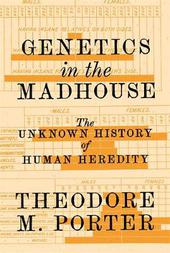
|
Genetics in the Madhouse: The Unknown History of Human Heredity
Hardback
Main Details
| Title |
Genetics in the Madhouse: The Unknown History of Human Heredity
|
| Authors and Contributors |
By (author) Theodore M. Porter
|
| Physical Properties |
| Format:Hardback | | Pages:464 | | Dimensions(mm): Height 235,Width 155 |
|
| Category/Genre | History of specific subjects
History of science |
|---|
| ISBN/Barcode |
9780691164540
|
| Classifications | Dewey:616.042 |
|---|
| Audience | |
|---|
| Edition |
New edition
|
| Illustrations |
20 b/w illus.
|
|
Publishing Details |
| Publisher |
Princeton University Press
|
| Imprint |
Princeton University Press
|
| Publication Date |
5 June 2018 |
| Publication Country |
United States
|
Description
The untold story of how hereditary data in mental hospitals gave rise to the science of human heredity In the early 1800s, a century before there was any concept of the gene, physicians in insane asylums began to record causes of madness in their admission books. Almost from the beginning, they pointed to heredity as the most important of these
Author Biography
Theodore M. Porter is Distinguished Professor of History and holds the Peter Reill Chair at the University of California, Los Angeles. His books include Karl Pearson: The Scientific Life in a Statistical Age, Trust in Numbers: The Pursuit of Objectivity in Science and Public Life, and The Rise of Statistical Thinking, 1820-1900 (all Princeton). He lives in Altadena, California.
Reviews"Winner of the Pfizer Award, History of Science Society" "Winner of the Cheiron Book Prize, Cheiron: The International Society for the History of Behavioral & Social Sciences" "One of Science News' Favorite Science Books of 2018" "I suspect this bold, dauntingly well-documented book will prove difficult to dismiss."---David Dobbs, Nature "By following the technologies of paperwork and data collection, Porter has unearthed a radically new history of human genetics, one that evokes not the double helix but the humble filing cabinet."---Emily M. Kern, Science "Fascinating but scary. Genetics in the Madhouse . . . uses date collection in psychiatric hospitals to show the stages when research straddles subjectivity and science."---Liz Else and Simon Ings, New Scientist "Porter takes a fascinating look at early attempts to tame unruly minds with big data and statistics."---Bruce Bower, Science News "Deeply researched and deftly argued."---Gregory Radick, Times Literary Supplement "[An] absorbing account of the role played by mental illness studies in gaining an early understanding of human heredity."---Robin McKie, The Observer "Genetics in the Madhouse provides a fascinating examination of investigations of human heredity, conducted long before DNA could be studied in laboratories."---Glenn Altschuler, Philadelphia Inquirer "Genetics in the Madhouse has the power to inspire, to captivate and to stimulate further research."---Nicholas P. Hatton, Medical History "Porter commands an impressive array of languages, and where his own knowledge falters, he has employed assistance to allow him to survey other sources that would otherwise have remained out of reach."---Andrew Scull, Brain Journal of Neurology "Porter has read voluminously in the secondary literature historians of psychiatry have produced. But more importantly, having done so, he has engaged in a positively prodigious amount of work in the archives. One can only admire the persistence and the diligence with which he has combed through an extraordinary array of materials . . . Genetics in the Madhouse is gracefully written, and Porter only occasionally gets bogged down in the minutiae of the archival materials he has spent so much time exploring."---Andrew Scull, Brain "Porter shows that the population view of mental illness persisted throughout the history of the asylum and flowed logically into the era of eugenics. And he also illustrates that the history of madness helps expand the history of genetics beyond a narrow view of genes. . . . His history makes it impossible to continue the disconnect between the data of the past and the assertions of the present."---Laura D. Hirshbein, The Common Reader
|